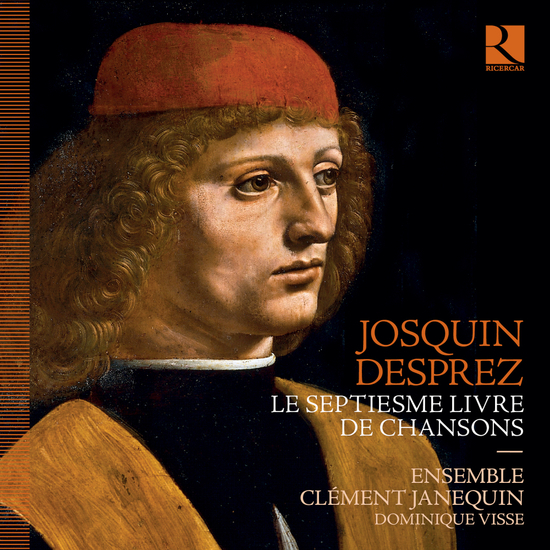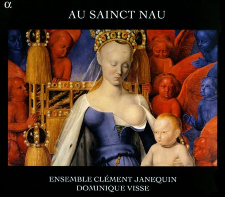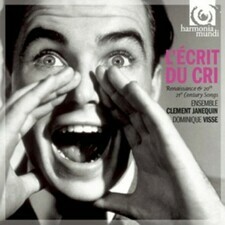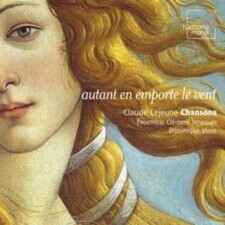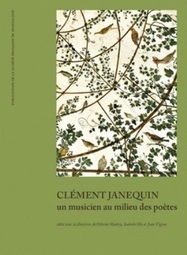Artists · Current artists · Ensemble Clément Janequin · Dominique Visse
Mousse et Pampre ou les Agapes de Bacchus et Cupidon, live recording on 23rd April 2024 at the Salle Cortot in Paris

![]()
Josquin Desprez, precursor and pop-star at the dawn of the Renaissance?
“At the same time as preserving its “high art” status, thanks to Josquin music became much more widely accessible. It could be said that he laid the foundations of today’s rock and pop music. Song, counterpoint, the bass line, an easily remember tune, all wrapped up in a varied polyphonic drape. From Josquin to Yelle via Lennon, Polnareff or Sheller, it is always more or less the same water flowing in the great river of music.”
Sébastien Porte, Télérama, 14th March 2021
https://www.telerama.fr/musique/josquin-desprez-precurseur-et-pop-star-a-laube-de-la-renaissance-6827621.php

“The unexpected timbre of the spinet is exquisite, bringing a spider-like finesse to the dense counterpoint. This varied palette reinforces the contrasting tone and atmosphere of the different chansons, and underlines their singularity… Released at the very beginning of the 500th anniversary year of his death, this magnificent anthology presents a beguiling musical testament of the grand master of the Renaissance.”
Guillaume Bunel, Diapason, March 2021

“The countertenor Dominique Visse and his Ensemble Clément Janequin have made a speciality of this repertoire, and its polyphonic wonders, in the case of Josquin, have nothing to envy the rich inventivity of his sacred music. This is convincingly proved by this album devoted to his Septième livre, a corpus of 24 chansons published more than twenty years after his death...
“Sensitively and delicately immersed in these intoxicatingly sensual songs, this disc, borne long by this mixture of expressivity, readability and vibrancy of each line so characteristic of the ensemble (listen how each singer bring life to his line with such refined crescendos and decrescendos) presents a joyfully contrasting bouquet of savours... Douleur me bat, whose wrenching melancholy passes with infinite poetry from voice to voice.”
Thierry Hillériteau, Le Figaro, 18th January 2021

“Dominique Visse and the Ensemble Clément Janequin are a safe bet in this repertoire. The stylistic mastery of the French ensemble produces an intimate, silky atmosphere, without resorting to any form of artificial affect, in which the clearly defined lines unfurl with irreproachable technique the heavenly counterpoint. The tempi chosen enable both an analytical and expressive approach to each piece. These interpretative choices bring all the necessary aura to the music of this great pillar of French music.”
Charlotte Saulneron, ResMusica, 21st February 2021

“But the most notable difference is the use of resonance. Polyphony is at the centre of the ensemble’s approach, and in the new recording the lyrics melt into the fullness of sound and the shifting sonorities. The noble, dignified musical interpretation and the power of the texts come together to make what is a monumentally beautiful recording.”
Yoshio Miyama - Critics Choice - The Record Geijutsu Disc Review, Japon, March 2021

“The Ensemble Clément Janequin’s joyful performances shine with engaging transparency. They navigate their sound world like fish in the sea...”
Wolfgang Reihing, Toccata Magazine CD Tipp, Allemagne, March 2021
The Ensemble Clément Janequin celebrated its 40th anniversary during the 2018-2019 season.

Created in Paris in 1978, the Ensemble Clément Janequin performs sacred and secular vocal music of the Renaissance, from Josquin to Monteverdi. Their inimitable performances of the 16th Century French chanson have revealed what is now appreciated to be one of the Golden Ages in the history of French music, their recordings for harmonia mundi, Les cris de Paris, Le chant des oyseaulx, Fricassée parisienne and La chasse being considered as benchmark interpretations. With tremendous appeal to a broad audience, these works by Janequin, Sermizy, Lassus, Lejeune and numerous others abound in the stylistic contrasts so dear to the Renaissance: the touching lyricism of the chanson amoureuse, the earthy humour of the chanson rustique that draws upon popular farce, the sounds of war, nature and street cries - a unique marriage of popular and high Renaissance culture.
The Ensemble Clément Janequin has performed extensively throughout the world, often with the support of the French Foreign Ministry. They have performed in the Amsterdam Concertgebouw, the Wigmore Hall in London, the Cité de la musique in Paris, Carnegie Hall in New York, the Konzerthaus in Vienna, the York and Boston Early Music Festivals, the Styriarte Festival in Graz, and in 2007 were ensemble in residence in the Laus Polyphoniae Festival in Antwerp, one of the world's leading early music festivals. The ensemble has also recently toured Spain, Belgium, Canada and the United States, at the Cervantino Festival in Mexico and recently in Brazil at Belo Horizonte and in Rio de Janeiro. It is a regular visitor to Japan as well as the Innsbruck Early Music Festival. In December 2008, the Ensemble Clément Janequin celebrated its 30th anniversary at the Théâtre des Abbesses in Paris.
The Ensemble also performs contemporary music and now proposes programmes ranging from Renaissance music to contemporary music.
In 2015 the Ensemble Clément Janequin gave the first performance of its new staged show, Zanni!, a contemporary and hilarious reading of 16th Century madrigal comedies staged by Laurent Serrano and that they have performed in Saint-Omer, Marseille, as part of the "Mars en Baroque" festival, at the Théâtre de Caen, the Théâtre La Merise in Trappes near Paris, at the Conservatory Auditorium in Tourcoing and in April 2018 at the Opéra de Montpellier. More recently the Ensemble has performed at the Musée de l'Armée and the Oratoire du Louvre in Paris, and also took part in the Concentus Moraviae Festival in the Czech Republic, Rougement in Switzerland, Thoronet in the South of France, Festival Baroque du Jura, in the Châteaux of Bournazel, Biron and Valençay, at the Via Lattea festival in Tessin region of Switzerland, the Château de Fontainebleau, Palais du Tau in Reims and the Palais des Papes in Avignon.
In the summer of 2018 they made appearances in several French festivals including the Abbaye de Sorèze, Château de la Possonnière and the Cité de la Voix in Vézelay. In the autumn the perform in Italy, France, Belgium and Romania before celebrating their 40th anniversary in Paris at the Théâtre des Abbesses and the "Notes d'Automne" festival.
The Ensemble’s numerous recordings of sacred and secular music of the Renaissance, mainly for harmonia mundi, have been widely acclaimed in the press and won numerous prizes and awards. The Ensemble's most recent recording, "Au Sainct Nau" for the Alpha label, was shortlisted for a Gramophone Award in 2015.

The Ensemble Clément Janequin is supported by the French Ministry of culture and communication through its Haut de France regional office.
August 2018
Press reviews
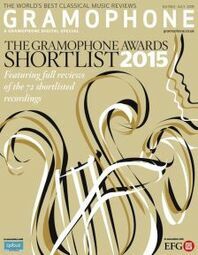
The Ensemble Clément Janequin's recent release on the Alpha label, 'Au Sainct Nau' has been shortlisted for a Gramophone Award. It was reveiwed in the magazine in February 2015 by Fabrice Fitch - 'It feels like a long time since the last release from Ensemble Clément Janequin. They’ve been going for about 35 years, and new recordings have been rarer in recent years, but this one is as impressive in its way as anything I’ve heard from them, and that’s saying something… It’s classic Dominique Visse, and it had me laughing aloud… the disc alternates sacred and secular with immaculate poise. The former is beautifully done… and the latter delivered as lustily as ever… The ensemble continues to do what it does best but retains a freshness and questing spirit that sometimes eludes groups of comparable vintage, a sense of joyous music-making that marked them out from the start and which they’ve never lost. It was utterly infectious then, and it still is.'
Washington Post
'The Ensemble Clément Janequin... gave a vivid performance of its namesake's music… in the Library of Congress... with singing that was sometimes sweet and smoothly blended, often raucous, frequently very funny and always virtuosic… Early music flourishes in Washington, but the city seldom hears a concert like this one.'
Joseph McLellen, 23rd Feb 1998
Los Angeles Times
'The Paris-based Ensemble Clément Janequin performed a generous sampling of this music with astonishing virtuosity. The perfection of the musicians' cohesion, intonation and balance, as well as the vim of their rapid-fire delivery, made them a joy to listen to.'
Timothy Mangan, 16th Feb 1998
Gramophone
, London
'…the overall blend is superb, and the rich, translucent sonority achieved is utterly compelling… the level of vocal energy and focus is always spot on, all of which is especially noticeable in the ensaladas. Herethe interpretation is just right: theatrical and colourful, often funny, but never camp or ludicrously over the top, all this stemming, I am sure, from Visse's own instinctive and secure sense of the theatrical.'
Tess Knighton, April 1998 (CD Canciones y Ensaladas HMC 901627)
'Nowhere has the Ensemble been more successful than in the Parisian chanson. I first got to know this repertory when the group's earliest LPs were being issued, and I've heard enough of the other recordings to realise that something very exciting was going on. That was over 15 years ago, and now it seems hard to imagine Sermizy or Janequin without the Ensemble Clément Janequin.'
Fabrice Fitch, April 1998 (Interview with Dominique Visse)
San Diego Reader
'The Janequin singer pay extraordinary attention to the expressive possibilities inherent in Renaissance polyphony; they phrase with great subtlety; their word-painting provides constant variety of tone; they shape the music beautifully; and they use every device of articulation, color, and shading to convey a broad range of emotional states.'
Jonathan Saville, 9th April 1998
The Independent
, London
'The impact was strengthened by the spare-no-prisoners, diamond-edged tone of Dominique Visse... the Ensemble Clément Janequin, secure in pitch and ensemble, full of character and alive to the bizarre humour and theatricality of songs that mimic everything from barking dogs and duff singers to crowing Frenchmen and cowardly Spaniards.'
Andrew Stewart, 30th November 1996
Early Music Magazine
, London
'The Ensemble Clément Janequin offer us an astonishing amount of musical variety and remarkable breadth of emotion. Their performance is a revelation.'
Early Music News
, London
'Would that each country had its ensemble to promote their indigenous song repertoires with such style as the French. This concert, devoted to Lassus and Josquin, was both packed and uplifting, to the extent of the English rising to their feet in applause.'
Richard Langhamn Smith, June 1994
The Financial Times,
London
'Their singing is extrovert and exuberant. The onomatopoeic effects of Le Chant des Oyseaulx, La Chasse and La Bataille were superbly and virtuosically realised. Altogether a delectable recital.'
Mainichi Shinbun
, Tokyo
'The encore, La Chasse, was the high point of the concert during which the audience's exultation became inevitable.'
Kleine Zeitung
, Graz
'... The Super Event ...the diversity of the singers’ powers of expression was astounding and the blending of the voices in the etheral pianissimos fascinating.'
Tiroler Tageszeitung
, Innsbruck
'Punk anno 1550'
Rainer Gstrein, 3rd September 1995
Josquin Desprez - Mille regretz de vous habandonner
2021 sees the 500th anniversary of the death of Josquin Des Pres, the most celebrated composer of his day. Dominique Visse and the Ensemble Clément Janequin are recording a selection of his chansons from two of the most important editions of his works, Susato’s in 1545 and Attaignant’s in 1549, for the Ricercar label.
These editions bear witness to the diversity of Josquin’s chanson writing, but above all to the melancholy and sorrow so present in his works, and are clearly tributes to this great composer, as is also evident in the two Déplorations on his death included on this recording, Musæ Jovis by Nicolas Gombert and O mors inevitabilis by Hieronymus Vinders, both from the Susato edition.
The programme, which includes a majority of chansons that are new to the Ensemble’s repertoire, endeavours to present a Josquin legacy, a post mortem illustration of his chanson œuvre, a remembering of his musical genius taken from these two editions, but is also Dominique and the Ensemble’s own Déploration on the death of Josquin, the culmination of 40 years exploring the Renaissance chanson.
Josquin Desprez « Mille regretz de vous habandonner »
Vive le Roy / Quand je vous voy
Du mien amant
Petite camusette a la mort mavez mis
Plus nulz regretz
Allegez moy ma doulce plaisant brunette
Si jay perdu mon amy
Mille regretz de vous habandonner (solo organ)
Mille regretz de vous habandonner
Mille regretz de vous habandonner (solo lute)
Faulte d’argent
Regretz sans fin il me fault endurer
El grillo e buon cantore
Douleur me bat
Scaramella va alla guerra
La Bernardina (lute & positive organ)
He lort villain jaloux
Baises moy ma doulce’ amye
Tenez moy en voz bras
Ma bouche rit et mon cueur pleure
Nymphes des bois
The concert programme is largely based on the album, a concert of approximately 1 hour 10' without interval.
Our concerts in Namur, Florence, Herve, Warsaw and Timisoara were made possible thanks to the support of the Centre National de la Musique.
Ensemble Clément Janequin
Anaïs Bertrand alto
Dominique Visse countertenor
Martial Pauliat & Hugues Primard tenors
Vincent Bouchot & Igor Bouin baritones
Renaud Delaigue bass
Eric Bellocq lute
Yoann Moulin chamber organ
Jiri Heger artistic direction / sound engineer

Giorgione - Impassioned singer
A Contrario
8 singers & organ - a sacro-profane programme
A Contrario is largely inspired by the 1540 edition of August Vindel and Melchior Kriegstein dedicated to Ferdinand 1st of Aragon, brother of Charles 5th and who succeeded him on the throne of the Holy Roman Empire following his abdication in 1556. The compilation is in the Vienna library and includes a large number of canons, both retrograde and mirror, in various complex forms containing numerous instances of false relation and dissonance. In addition to the extracts from this compilation are a number of delightful contrafactum and melancholic songs on the theme of contrariety from the Renaissance period, such as Quand contremont verra retourner Loire by Clément Janequin.
Jacques Arcadelt
1507 - 1568
Missa Noe noe, Kyrie
Alterné avec le Contrafactum ‘Kyrie le jour de noël’, qui se chante sur Kyrie fons bonitatis
Eustache du Caurroy
1549 - 1609
Une jeune pucelle
Contrafactum de ‘Une jeune fillette’
Claudin de Sermizy
1490 - 1562
L’on sonne une cloche
Contrafactum de ‘Harri bouriquet’
Josquin Desprez
1450 - 1521
Missa l’homme armé, Gloria
Le Cantus Firmus au Ténor est chanté normalement dans la première partie puis en rétrograde dans la seconde
Adrien Willaert
1490 - 1562
Quid non ebrietas
Chanson à boire avec Ténor qui descend par le cycle des quintes jusqu’à sonner un ton en-dessous de ce qui est écrit
Jean Mouton 1459 - 1522
Salve mater salvatoris
Canon en miroir entre ténor et basse, Duo adversi adverse in unum
Jacob Obrecht 1457/1458 - 1505
Missa Scaramella, Sanctus
Bassus en aller-retour rétrograde, puis différentes voix en courtes sections systématiquement répétées deux fois
Claude Martin
fl.1540 / 1550
Mort et Amour donnerent pris contraire
Clément Janequin 1485 - 1558
Quand contremont verra retourner Loire
Mittantier / Crecquillon fl.1536-1547 / c.1505 - 1557
En espérant, espoir me désespère
Rondeau par contradiction de Clément Marot
Josquin Desprez
Ma bouche rit et mon cueur pleure
Decarella
fl.1550
Hellas Vénus, trop tu me fuz contraire
Pierre Certon 1515 - 1572
Reviens vers moy qui suis tant désolée
Nicolas Gombert 1457 -1458
Agnus Dei I
Contrafactum sur Mille regretz
Josquin Desprez
Missa Fortuna disperata, Agnus Dei II
Basse en miroir de Fortuna disperata
Benoit Appenzeller 1480 - 1558
Agnus Dei III
Canon Cancrizans de quatre voix sur quatre
This programme was commissioned by the Festival de musique ancienne de Lanvellec.
The Field of the Cloth of Gold
June 1520
5 singers, 4 brass, chamber organ (programme sacro-profane)
« Ledit jour du sabmedi 23° jour du juing du matin au milieu dudit camp où avoit esté fait ledit tournoy, fut dressé un écharfault où fut apprestée ungne chapelle.
« Et au bout d’icelle fut richement paré ung autel aorné de décoré de plusieurs beaux reliquaires riches et triomphans. Entre ladite chapelle et l’écharfault des roys et roynes, y avoit ung aultre espace à pleine terre, là où estoient les chantres desdits roys, et avoient chascun son popistre. Et dessus desdits escharfauts furent dressez deux oratoires, l’un pour les roys, l’autre pour les reynes, avec plusieurs autres chambrettes rapissées, et ornées richement pour les princes et princesses.
« Et environ l’heure de midi fut par le légat d’Angleterre commencé la grand’messe.
« Le premier Introit fut dit par les chantres d’Angleterre, le second par ceux de France, et fut accordé entre lesdits Chantres que quand l’organiste de France toucheroit les orgues, qu’ils chanteroient, et pareillement quand l’organiste d’Angleterre joueroit, que ceux de son pays chanteroient.
« Et par ainsi maistre Pierre Mouton commença à jouer le Kyrie avec les chantres de France. Le Gloria in excelsis, par l’organiste et chantres d’Angleterre, Patrem, par ceux de France, là où estoient les sacqueboutes et joueurs d’instruments de François I avec les chantres, et les faisoit si bon ouir, qu’il est impossible d’ouir plus grande melodie. Le Sanctus fut dit par ceux d’Angleterre, et l’Agnus Dei par ceux de France, qui dirent à la fin plusieurs motets, qu’il faisoit bon ouir. »
Le banquet qui succéda immanquablement à la cérémonie religieuse fut musical, chanté et encore « corné », selon l’expression employée à cette époque, c’est à dire accompagné de sacqueboutes et cornets.
The Mass
Claudin de Sermizy
1490 - 1562
Messe plurium motetum, Kyrie (Sermisy était au Camp du Drap d’Or, Attaignant 1532)
Anonymous
Missa Lhomme armé, Gloria (Pierre Alamire pour Henry VIII et Catherine d’Aragnon)
Clément Janequin 1485 - 1558
Messe La Bataille, Credo, (Jacques Moderne, Lyon 1532)
Robert Fayrfax 1464 - 1521
Missa O quam glorifica, Sanctus (Robert Fayrfax était au Camp du Drap d’Or)
Jean Mouton 1459 - 1522
Missa loseray je dire, Agnus
Da pacem Domine (Jean Mouton était au Camp du Drap d’Or)
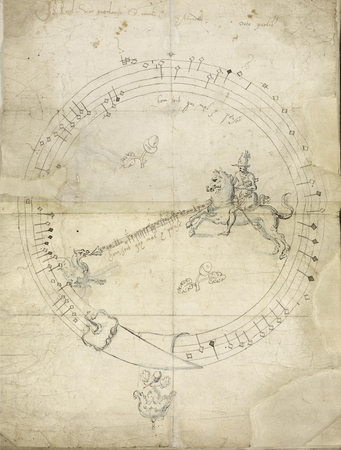
Canon Honi soit qui mal y pense
Le Banquet Musical
Josquin Despres
1459 - 1522
Vive le roi Françoys (Petrucci 1501)
Morel
Honi soit quy mal y pense, canon (Ms. de Pierre Alamire pour Henry VIII et Catherine d’Aragon)
Henry VIII
1491 - 1547
Pastyme, The Kynge ballad (Londres vers 1513)
Jean Richafort 1480 - 1547
De mon triste deplaisir (Attaignant ‘Trente et quatre chansons’ 1529)
Henry VIII
Helas madam (Londres vers 1513)
Jacob Obrecht
1457/58 - 1505
Rompeltier, Petrucci 1501 (instrumentale)
Henry VIII
Tander Naken, Song book, c.1518 (instrumentale)
Anonymous
Aporte a boyre et du sale (Attaignant 1528)
Claudin de Sermizy
Hau hau je boys (Attaignant 1529)
Robert Fayrfax
That was my woo (The Fayrfax manuscript, ca 1500)
Claudin de Sermizy
Las je my plains, mauldicte soit fortune (Texte de Françoys I, Attaignant 1528)
Las je my plains (Attaignant, 1530, orgue solo)
Robert Fayrfax
Sumwhat musing (The Fayrfax manuscript, ca 1500)
Pierre Attaignant c.1494 - 1551/1552
Basse dance La Brosse, Pavane et Tourdion (Attaignant 1530)
William Cornysh
1465 - 1523
A Robyn, gentyl Robyn (William Cornish était au Camp du Drap d’Or)
Josquin Despres
Adieu mes amours (Petrucci 1501)
William Cornysh
Adew mes amours
Clément Janequin
La chasse (Attaignant 1528)
For our other programmes see French page via these links :
Secular music programmes
Sacred music programmes
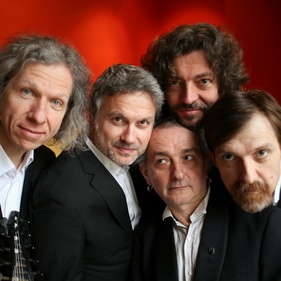
Josquin Desprez - Mille regretz de vous habandonner

A Contrario
The Field of the Cloth of Gold
Educational videos
Press reviews
The recent book on Clément Janequin published by the Société Française de Musicologie:
